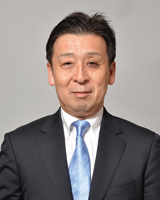The description herein refers to the opinions based on this report, a related website, and also interviews held with persons in charge from the planning, quality assurance and materials functions of Yokohama Rubber’s Tire and MB divisions, as well as from the Corporate Quality, Human Resources and Health and Safety, General Affairs, Compliance and CSR departments, along with on-site observation of activities aimed at helping to safeguard biodiversity at the Hangzhou Plant of Yokohama Rubber Group member company Yokohama Rubber Industrial Products Shanghai Co., Ltd.
Suffice to say, Yokohama Rubber’s various approaches to CSR are steadily progressing under the PDCA*1 management cycle, especially with regard to its mitigation of environmental impacts.
*1PDCA:
A method for continually improving operations through the repeated cycle of plan, do, check and act.
IIHOE
Hideto Kawakita
CEO and Editor/Publisher of Socio Management
International Institution for Human,
Organization and the Earth (IIHOE)
IIHOE: The International Institute for Human, Organization and the Earth is a non-profit organization established in 1994 for the democratic and balanced development of all the lives on the earth. Although it mainly provides management support for citizens’ groups and welfare workers, the group is also heavily involved in providing CSR support to large corporations.
http://blog.canpan.info/iihoe/ (available only in Japanese)
Truly Commendable Areas
- Regarding conservation of biological diversity, I commend the Company for carrying out initiatives to foster a correct understanding of ecosystems and the positive and negative impacts that the Company’s operations have on them, including by hosting employee-led workshops and briefings for the local community as well as conducting activities aimed at conserving biological and ecosystem diversity autonomously across a wide area, at seven factories in Japan, including the Mie Plant, based on the preliminary studies implemented at 15 of the Company’s business locations both in Japan and overseas in fiscal 2010. In particular, I highly praise the fact that members comprising managerial employees taking part in activities at the Mie Plant have taken the lead in the monitoring efforts, which are ongoing. The Company has also begun to implement continuing efforts to monitor the state of ecosystems in the vicinity of its overseas production facilities, such as the Hangzhou factory. I hope that the Company will continue with these efforts, which use surveys of the current situation to provide a foundation for safeguarding and revitalizing ecosystems, at both its Japanese and overseas facilities in the future.
- Regarding the Yokohama Forever Forest Project, in the eight years since the project was launched Yokohama Rubber’s domestic and overseas sites have planted more than 410,000 trees with suffi¬cient consideration towards the conservation and improvement of biodiversity. They nurtured the seedlings on their own, and not only were 83% supplied within the Yokohama Rubber Group in fiscal 2015 in Japan, but also they have provided a cumulative total of more than 270,000 seedlings so far to municipal governments and other companies. I also commend the Company for playing a leading role in the “Green Coastal Levee that Protects Lives” project planned for those areas affected by the Great East Japan Earthquake. I also truly commend this world-leading initiative for contributing to society to preserve and improve forest ecosystems and greenery. Going forward, I hope that the Yokohama Forever Forest Project website will evolve into a portal that also introduces (in a multilingual format) many examples of similar initiatives taking place at other companies.
While Approving of Progress, Areas that May Require Further Improvement
- Regarding corporate governance and CSR promotion system, while I commend Yokohama Rubber for establishing interim targets up to 2017, when it celebrates its centennial anniversary, and promoting initiatives using key performance indicators (KPI) based on the core issues addressed by ISO26000*2, going forward I sincerely hope the Company will develop a system that, led by the managers responsible for planning in each division, focuses on the Company’s position in world markets and the evolution of its business model in the 2020s, and in particular, that it will continue to use targets and measures created using a bottom-up approach at its domestic and overseas sites in order to incorporate many different values globally in its management decisions and practices, and to promote the appointment of a diverse range of human talent to managerial positions. In terms of its reporting and communication, I would like to commend the Company for providing more detailed introductions of the initiatives being carried out by major Yokohama Group business locations in Japan and abroad; I hope that the Company will continue to provide this information in more detail, and also that the Company will promote stakeholder*3 engagement further as required by ISO26000, setting up opportunities for continuous dialogue with NPOs in important operating regions.
- Regarding its quality assurance promotion system, in regard to the discovery in February 2016 that the Yokohama Rubber had shipped tires with incorrect product labels attached, I commend Yokohama Rubber for implementing measures to prevent reoccurrence and for launching a “Company-wide Key Essentials Management System”; in the future, I continue to look forward to seeing the Company incorporate the minimization of impacts on customers as part of its management indicators and further advance quantitative and effective measures.
- Regarding the reduction of environmental impacts, I would like to commend the Company for its development of technology that helps to make tires lighter, with better aerodynamic performance, and for its improvement (compared to the previous year) and achievement of interim targets in regard to total waste generated (on a per unit of production output basis) and greenhouse gas emissions (total emissions). Going forward, I strongly encourage the Company to try to meet the target that the Japanese government has recently set of reducing greenhouse gas emissions by 26% by 2030 (compared to 2013) as soon as possible, and to thoroughly shed light on its challenges and methods, such as transitioning to the non-fixation of energy usage adjustable to the fluctuation of production volume (Just- In-Time for Energy), and also to expand the use of powdered recycled rubber.
- As for CSR at suppliers, I commend the Company for encouraging natural rubber suppliers in Thailand to adopt “Agro-Forestry” techniques, for continuing to hold CSR workshops for suppliers in key countries, and for establishing a commendation system based on feedback from suppliers in regard to the results of supplier self-checks and field surveys. In order to more effectively improve initiatives being undertaken by suppliers, I strongly encourage the Company to implement more detailed evaluation of individual items and measures taken, and to establish a support system with suppliers for sharing and problem solving actual cases and further understanding initiatives in greater detail.
- As regards employee safety, I commend Yokohama Rubber for responding to the serious accident that occurred in fiscal 2013 by investigating and rectifying the situation company-wide, and expanding the scope of the rectification efforts to include temporary and agency staff; the Hangzhou factory is also now implementing experiential training on an annual basis, with all employees from the plant manager on down required to participate. Moving forward, I continue to urge the Company to incorporate safety improvements and remedies for facility specifications without fail and to issue a report about the progress of evaluations and improvements to ensure the greater effectiveness of safety measures.
- Regarding improvement of workplaces’ ability to retain employees, I commend the fact that 3.91% of Yokohama Rubber employees took advantage of the systems for paid vacation, leave of absence or shorter work hours in order to care for a child or family member in need, and that Yokohama Rubber is working in collaboration with the labor union to arrange the holding of nursing care leave seminars. I continue to strongly urge the Company to establish an environment where employees can continue to work, while also taking leave. In terms of mental health care, I commend the Company for establishing hotlines where employees can discuss any problems they may be experiencing, including non-work-related matters; I hope that the Company will promote more effective measures of this kind in the future. I also praise the Company for making progress with the reemployment of retired workers and I expect the Company to encourage the participation and involvement of reemployed workers in their local communities.
- As regards the enhancement of the human resource portfolio required as a global corporation over the midterm, I think it is good that the Company is continuing to strengthen personnel development efforts across the Group (including overseas business locations) for managerial level employees; for example, at the Hangzhou plant, employees who were working at section chief level when the plant was first established have since been promoted to department manager. Meanwhile, going forward, I strongly encourage the Company to accelerate its development of the next generation of executives at both its head office and overseas sites based on a long-term goal and strategy that reflects how the Company sees itself being positioned in global markets in the 2020s, and the business models that it expects to have adopted.
- As regards employment of persons with disabilities, I commend the Company for achieving the statutory employment rate of persons with disabilities and expanding job opportunities. I ask that the company to continue to work proactively toward implementing measures to ensure that employees with disabilities are retained over the long term.
*2 ISO26000:
A set of guidelines created by the International Standards Organization (ISO) on the social responsibilities of companies and other organizations.
*3 Stakeholder:
The individuals, groups and concerned interests with a stake in the activities of a company or any other organization.



